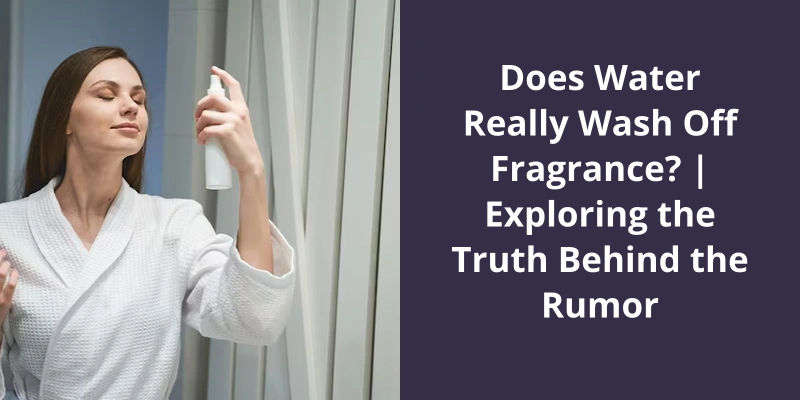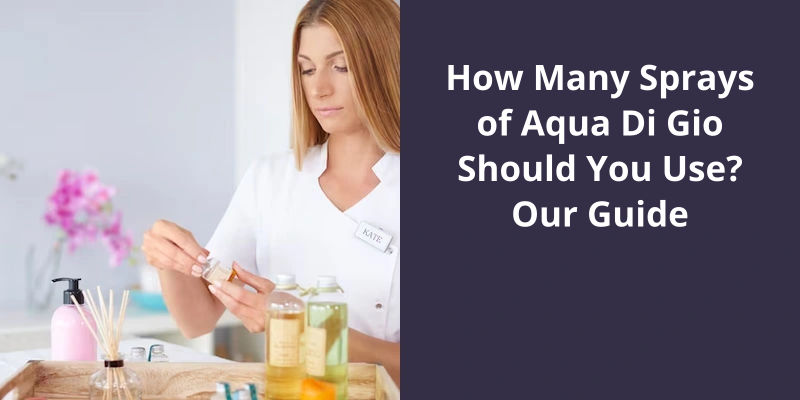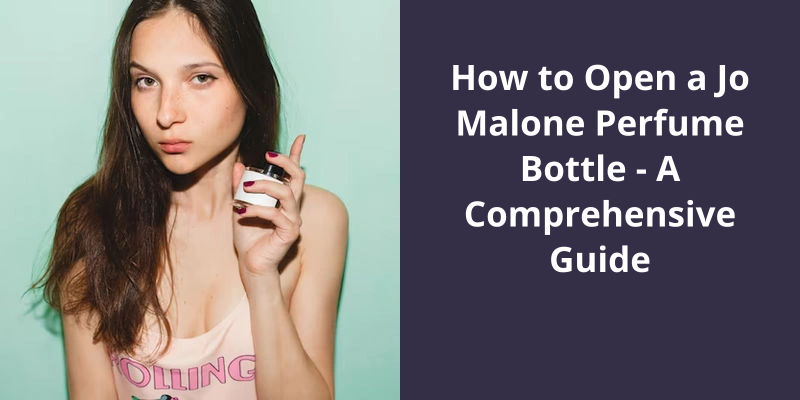Yes, water can indeed wash off fragrance. When you apply a fragrance, its molecules cling to the oils on your skin. However, because water is not oily, it has the potential to reduce the concentration of these oils, leading to the washing off of the fragrance. Showering with hot water or going swimming, especially, can significantly decrease the longevity of your fragrance. But remember, water is not the only factor that can cause your fragrance to fade; heat, sweat, dry skin, and even certain types of fabric can play roles as well. Thus, if you want your fragrance to last longer, it’s best to apply it on moisturized skin and avoid exposing the area to much water or heat.

Does Water Ruin Perfume?
This is why it’s important to store your perfume in a cool, dry place away from any moisture or humidity. Exposure to water can alter the delicate balance of ingredients in a fragrance and can cause it to lose it’s original scent or even become rancid. This is especially true for fragrances that contain natural ingredients, which are more susceptible to spoilage.
In addition to water, other factors can also cause damage to your perfume. Exposure to sunlight, heat, and air can all impact a fragrances longevity and quality.
If you accidentally get water on your perfume, don’t panic. Simply use a clean, dry cloth to gently dab away any moisture. Avoid rubbing the fragrance as this can cause further damage. If the perfume has already been damaged by water, you may notice a change in it’s scent or appearance. In this case, it’s best to discard the bottle and purchase a new one.
Ultimately, the best way to protect your perfume from water damage is to be proactive about storing it properly. Keep your fragrance in a cool, dry place away from any sources of moisture or humidity. And if you do accidentally expose it to water, take immediate steps to remove the moisture and prevent further damage.
While water may seem innocent enough, it can actually be quite damaging to your beloved fragrance. With proper care, your perfume can continue to bring you joy for years to come.
Differences Between Natural and Synthetic Fragrances
- Natural fragrances are derived from natural sources such as plants, fruits, and flowers.
- Synthetic fragrances are created in a laboratory using chemicals.
- Natural fragrances are often considered to be safer and more eco-friendly than synthetic fragrances.
- Synthetic fragrances may contain harmful chemicals that can cause irritation or allergic reactions.
- Natural fragrances tend to have a more subtle and unique scent, while synthetic fragrances can be easily replicated and mass-produced.
- Natural fragrances are typically more expensive than synthetic fragrances due to the cost of sourcing and extracting natural ingredients.
- Synthetic fragrances are often used in a wide range of products including perfumes, cosmetics, and household cleaners.
- Natural fragrances are becoming increasingly popular as consumers become more aware of the potential risks associated with synthetic fragrances.
- It’s important to read product labels and ingredients lists to determine whether a product contains natural or synthetic fragrances.
With so many people using perfume products on a daily basis, it’s important to understand how to effectively neutralize the scent when needed. Fortunately, there’s a handy tip from Glen Anderson at Avon, who recommends using alcohol to neutralize perfume instead of scrubbing with soap or water. This method can work wonders and keep you smelling fresh and clean.
Does Perfume Go Away With Water?
If youve ever sprayed too much perfume and found yourself regretting it later, you may have wondered if theres any way to make it go away. While soap and water can help to some extent, the scent of perfume tends to linger on the skin and clothing long after weve left the room. This can be especially frustrating if you don’t want to wear a certain scent anymore, or if youve accidentally sprayed too much and need to tone it down quickly.
Fortunately, there’s a solution: alcohol. According to Glen Anderson of Avon Products, adding alcohol to the mix can help to neutralize the scent of perfume and make it go away faster. This is because alcohol is a natural solvent that can break down the oils and chemicals in perfume and help to evaporate them more quickly.
Of course, there are some caveats to this approach. For one, you don’t want to use too much alcohol, as it can dry out your skin and cause irritation. Additionally, not all types of alcohol will work the same way. For best results, choose an alcohol-based product that’s specifically designed for use on skin or clothing, and follow the instructions carefully. This will help to ensure that you get the desired effect without causing any damage or irritation.
Another thing to keep in mind is that some perfumes may be more difficult to neutralize than others. This could be due to a number of factors, such as the concentration of the scent, the type of oils and chemicals used to create it, or the pH level of your skin. So while alcohol can be an effective tool for getting rid of unwanted perfume, it may not work in every situation.
Overall, the answer to the question of whether perfume goes away with water is: not really. While water can help to dilute the scent and make it less noticeable, it won’t necessarily make it go away completely. Just be sure to use it in moderation and follow the instructions carefully to avoid any unwanted side effects.
The Effects of Perfume on People With Allergies or Sensitivities
This is a brief overview of how fragrances can affect those who’ve allergies or sensitivities. It’s important to note that individuals may have different reactions to perfumes and fragrances, and that it’s best to speak with a healthcare professional if you’re experiencing symptoms. Some people may experience mild or severe respiratory problems from exposure to fragrances, while others may experience skin reactions or headaches. It’s important to avoid exposure to fragrances when possible, and consider hypoallergenic products or fragrance-free alternatives.
Overall, it’s important to know when and how to apply perfume for maximum effectiveness and longevity. While some may wonder if it’s okay to put perfume on after a shower, this article will explore the benefits and drawbacks, plus tips for getting the most out of your fragrance.
Is It OK to Put Perfume After Shower?
Perfume is a fragranced liquid mixture that people wear to enhance their natural odor or to create a new one. It’s one of the most popular beauty products around the world, and people love wearing perfume to feel confident and attractive. Traditionally, people have been using perfume to mask unpleasant body odor. However, today it’s more commonly used as pure personal pleasures of feeling good about ones self.
If youre one of those people who love wearing perfume, you might be wondering whether it’s okay to put it on after a shower. The answer is an absolute “Yes!” because it’s actually the best time to put it on. After a shower, your skin is fresh, clean, and open, making it the perfect canvas for your favorite perfume.
When you take a hot shower, your pores open up, allowing your skin to breathe and absorb moisture, making it easier for you to apply the perfume. This means that the fragrance will be well-absorbed, and it will last longer. So, it’s important to apply your perfume immediately after you shower to let your skin soak it up.
The trick is to be gentle and not rub your skin too hard while drying off so that you don’t remove the showers natural moisture. This is important because dry skin won’t absorb the scent well and won’t retain it for a long time. So gently towel-dry your skin and then apply your perfume to your pulse points such as your wrists, neck, and behind your ears for the best results.
After a refreshing shower, your skin is receptive, and the perfume can be absorbed effectively, leaving you smelling fantastic all day long. So, go ahead, shower, and spritz away, and enjoy the aroma of your favorite scent.
Tips for Choosing the Right Perfume for Your Body Chemistry
Choosing the right perfume involves considering your body chemistry. Each fragrance interacts with the body differently, making it essential to pick the right scent that suits you. To select the right perfume, you should understand your body’s natural scent, choose the right scent family, test fragrances on your skin, and select the right concentration. With these tips, you can pick a fragrance that complements your body and style.
This intriguing detail raises questions about the purpose and effect of water in perfumes. Does it dilute the fragrance or enhance it? What precisely is the relationship between water and perfume? To answer these questions, we need to delve deeper into the science of perfume-making.
Does Water Affect Perfume?
“” This means that water can actually help a perfume last longer on your skin! This may seem counterintuitive, as water can often dilute fragrances, but it seems that in small amounts, water can actually enhance the scent.
Additionally, water is often used in the creation of perfumes. Fragrance oils and other ingredients are mixed with water to create blends that are then allowed to age and mature over time. Without water, some scents could become too strong and overwhelming, causing discomfort to the wearer or those around them.
It’s also worth considering the effects of different types of water on perfume. For example, hard water may react differently with certain ingredients than soft water, which could potentially alter the scent of the perfume. Similarly, water from different sources (e.g. tap water vs. distilled water) could have different effects on the fragrance.
Some perfumes are designed to be used dry, and may be applied directly to the skin without the need for water. However, even these perfumes may contain small amounts of water in their formula, as this can help to distribute the fragrance evenly across the skin.
How Water-Based Body Lotions or Oils Can Affect the Scent of Perfume Applied on Top of Them.
- Water-based body lotions can dilute the scent of perfume applied on top of them
- Oil-based body lotions can enhance the scent of perfume applied on top of them
- The pH level of the body lotion can also affect the scent of the perfume
- If the body lotion has a strong fragrance, it can clash with the perfume and create an unpleasant scent
- To get the best results, it’s recommended to use a non-scented, moisturizing body lotion before applying perfume
It’s common knowledge that the right cologne can do wonders for your appearance and confidence. However, have you ever wondered if your body wash might be interfering with the scent? While it may not seem like a big deal, the type of body wash you use can impact the overall fragrance experience. In fact, some brands are beginning to create body washes that complement their colognes. So, what’s the deal with body wash and cologne? Let’s explore.
Does Body Wash Interfere With Cologne?
When it comes to grooming, scent is just as important as any other component. From deodorant to cologne, men are expected to smell good throughout the day. Body wash, too, plays an important role in this olfactory experience. The question is, can your body wash interfere with your cologne?
In fact, if anything, it can complement it. Body wash provides a refreshing and clean base layer for cologne to build off of. This is especially true if you use a body wash that matches your cologne or shares similar notes.
More and more brands are recognizing the importance of matching fragrance products, creating body washes and colognes that complement each other. This trend specifically targets men, who’re ramping up their grooming routines and investing in high-quality grooming products. By matching body wash and cologne, you can’t only achieve a long-lasting scent but also simplify your grooming routine.
By choosing complementary scents and high-quality, gentle products, you can create a long-lasting and harmonious scent experience that will make you feel confident and ready to conquer the day.
Source: Colognes with a Matching Body Wash: Overkill, or Oddly Useful?
Conclusion
In conclusion, trying to wash off a fragrance with just soap and water is an ineffective method as the scent tend to linger. However, the good news is, there’s a solution to the problem, and that’s through the use of alcohol. This tip from Glen Anderson from Avon teaches us that neutralizing the scent is the best way forward rather than masking it with another scent. With this information, it's safe to say that we can all confidently wear our favorite fragrances without worrying about it’s lingering effects.




